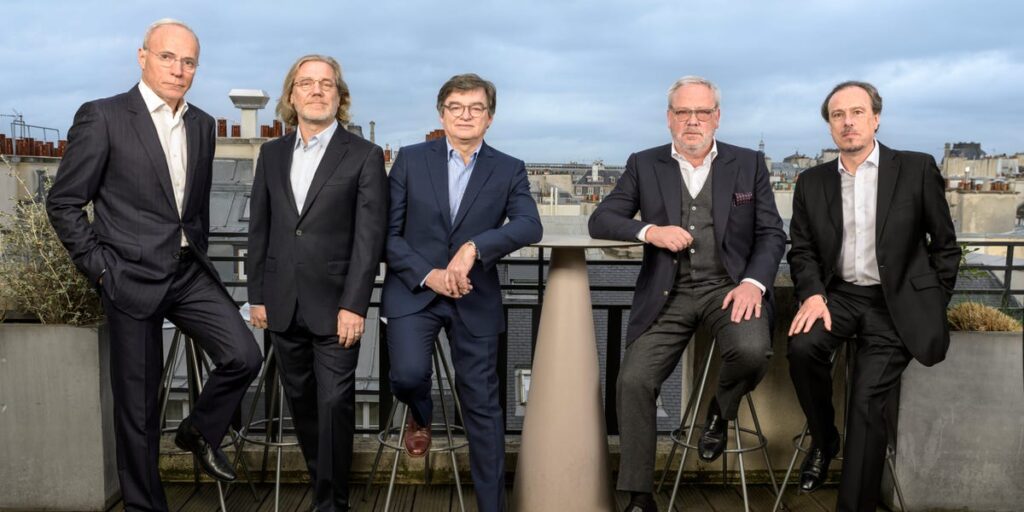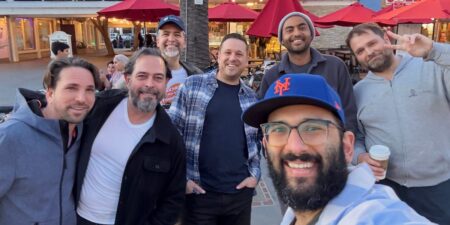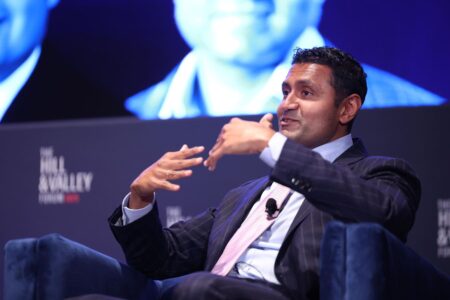In the ritzy 7th arrondissement of Paris, in a building that also counts fashion house Yves Saint Laurent as a tenant, $18 billion Capital Fund Management is hoping to straddle the line.
The quant firm is trying to retain what it believes is its edge — an academic culture with a French flair — while also expanding its reach and brand in the US. The manager is happy to see Paris’s financial services footprint grow, but wary of new competition entering its backyard. CFM is simultaneously proud of its 34-year-old history and constantly iterating on things that have historically been successful.
“The apocalypse is on the horizon at all times,” said Philippe Jordan, the firm’s president, from CFM’s offices located on the River Seine’s left bank across the water from the Louvre.
While Jordan was being somewhat tongue-in-cheek, the constant anxiety is understandable in an industry hyper-focused on the what-you-have-done-for-me-lately. The firm’s $12.5 billion flagship fund, Stratus, was up 14.2% in 2024 and notched a 2.9% return through 2025’s first four months, despite losing money in April. The manager’s longest-running fund, $2.2 billion Discus, made more than 10% a year on average between 1991 and 2024, but is slightly down in 2025.
The firm’s academic and research-driven DNA is maintained by its ties to Paris’s academic scene, which is known for mathematical talent from neighbouring universities like École Normale Supérieure and École Polytechnique. It’s something that the firm’s hoping to hold onto despite fellow quant Qube Research & Technologies and giants like Point72 establishing larger footprints in the city.
The firm’s office is a clean metaphor for how it is blending tradition and innovation: On a centuries-old street where Napoleon’s chief diplomat and the author of “The Three Musketeers” once lived, the glass conference room walls are filled with mathematical equations written in dry-erase markers.
“There’s a constant race between alpha creation and alpha degradation,” said Jean-Philippe Bouchard, the firm’s chief scientist.
Academic inspiration
A dream of the manager’s late cofounder, Jean-Pierre Aguilar, who died in a gliding accident in 2009, was that the firm would one day be “a cupboard full of computers” that just needed someone to turn it on to “magically make money,” according to Laurent Laloux, CFM’s chief product officer.
“The idea of having technology and research interacting with capital markets to make money was there at day one, and we’re trying to do it, but we have to evolve with the times in order to make it happen,” Laloux said.
From the research and technology side, it’s making sure they’re always on top of the latest discovery from academics and scaling internal computing power as fast as possible.
The manager’s latest big hire is NYU mathematician Eric Vanden-Eijden, who is one of the most cited researchers in his field, according to Google Scholar. He is leading an internal AI effort that will both publish academic papers and work with the firm’s researchers to find new investment opportunities. The addition of Vanden-Eijden, the firm’s executives said, came with the promise that any needed technological juice would be available for him.
Vanden-Eijden has known CFM’s leadership, specifically Bouchard, for years and was convinced to move from New York to Paris for the job. He’s far from the only academic to be drawn to the manager.
The firm strives to hire 15 doctorates a year to its research team, and Bouchard, who is a professor at the elite ENS where he got his doctorate in theoretical physics, said the firm’s “originality” has come from CFM existing at the “border” between finance and academia.
“We’re able to source inspiration from cutting-edge research of academia,” said Bouchard. He, Laloux, and CFM’s chief investment officer Marc Potters all have Ph.D. degrees.
“People from all over the world know that there’s academic excellence in Paris, and there’s quality of life in Paris, and so Paris is very attractive for people who we want to hire,” Bouchard said.
But there’s more competition than ever for this talent.
Paris push
The French capital has a long tradition of mathematical excellence. Its universities emphasize theoretical training and are top destinations for research. They have also produced some of the world’s top math geniuses. Of the 64 winners of the Fields Medal, dubbed the Nobel Prize of math, 13 have been French.
This has made it a hotbed of quant talent. Previously, top banks and asset managers would recruit graduates to join teams in New York or London. Now, many of these firms are expanding their presence in Paris to tap into this talent pool.
Fast-growing Qube is run by a group of former Credit Suisse traders, several of whom are French, from its London headquarters, but with an expanding Paris presence, as evidenced by the dozens of open roles in the French capital on its website. Quants like Squarepoint and Point72’s Cubist unit have significant Paris headcounts. Quant-heavy multistrategy fund Centiva Capital opened up an office in the city in recent years.
Former Eisler partner Adrien Delattre’s new firm, which will manage money exclusively for Millennium to start, is one of the industry’s most closely watched launches and will operate out of Paris. RBC’s BlueBay fixed-income investing unit is opening a Paris office, according to local media reports.
“There are new firms here that poach from us. We’ve gone from being slightly provincial to being more plugged into the whole world,” said Jordan, CFM’s president.
While Bloomberg reports that some global investment banks may be slowing down their French expansion, given a tax increase and shaky domestic politics, buy-side firms continue to build out in the region. Data from regulatory filings compiled by fund tracker Old Well Labs show that Qube’s investment staff in the city is now 160, compared with 50 in 2022, while Point72 and Citadel have more than doubled their Parisian trading staffs since 2022.
While there is new competition for their talent, there’s also a bigger overall pool of talent to fish in.
Jordan cited the firm’s chief technology officer, Benjamin Roy, who most recently worked for French investment bank Societe Generale in New York, as someone whom the firm was able to recruit because the city’s “ecosystem is sufficiently large and healthy.”
While CFM’s remains committed to its culture and Parisian roots, Jordan recognizes that there is no time for “nostalgia” in asset management.
The firm’s foundation is just as important as its constant evolution, including its focus on growing globally. CFM has been building deeper relationships with distribution partners in places like the US, such as financial advisory firm Stifel, which has several CFM funds on its advisors’ platform.
“No one cares what you’ve done, they care about what you can do,” Jordan said.
“If you want to survive and be successful, look at the future. Life is lived forwards, not backwards.”
Read the full article here
















